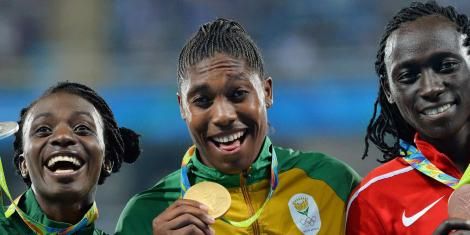
Aiming to help sports write eligibility rules for transgender athletes, the IOC published advice Tuesday 16th November shifting the focus from individual testosterone levels and calling for evidence to prove when a performance advantage existed.
No athlete should be excluded from competing based on an “unverified, alleged or perceived unfair competitive advantage due to their sex variations, physical appearance and/or transgender status,” the International Olympic Committee said.The six-page document follows years of consultation with medical and human rights experts and, since 2019, athletes directly affected to help draft guidelines promoting fairness and inclusion.
It is published and reported after the Tokyo Olympics, where the first out transgender woman, weightlifter Laurel Hubbard, competed at the Games and defending 800m champion Caster Semenya was among track athletes with naturally high testosterone levels excluded from their best events.
Two times 800m Olympic gold medallist, Caster Semenya will be allowed to compete without restriction until the Federal Supreme Court of Switzerland has passed judgment on a new IAAF now World Athletics ruling.
The Court of Arbitration for Sport (CAS) ruled that the World Athletics could implement a regulation that would require Semenya to take medication to lower her testosterone levels in order to compete against women in track events ranging from 400 meters to a mile.
However, the three times world champion in 800m has continued to challenge the ruling and lodged an appeal in Switzerland last week. The 28-year-old asked the Swiss Federal Supreme Court to set aside the decision in its entirety. It has now been confirmed that the IAAF must suspend its implementation of the regulations until the Swiss Supreme Court, which will receive submissions from the body, has made a ruling.
Dorothee Schramm, Swiss counsel for Semenya, said: “The Swiss Supreme Court has granted welcome temporary protection to Caster Semenya. This is an important case that will have fundamental implications for the human rights of female athletes.”
The IOC document is not legally binding yet clearly stated what it now expects from governing bodies responsible for regulating their own sports. Ruling some athletes ineligible in some sports is still expected with safety noted as a specific issue for combat and contact sports.
“Athletes should be allowed to compete but unfair advantage needs to be regulated,” said the IOC, which will help fund research into elite performance by transgender and intersex athletes. A target of next March, weeks after the Beijing Winter Games close, was set to launch a program of online workshops with sports bodies and athlete representatives.
“We have not found the solution to this big question,” IOC spokesman Christian Klaue said. “Clearly this is a topic that will be with us for a long time.”
